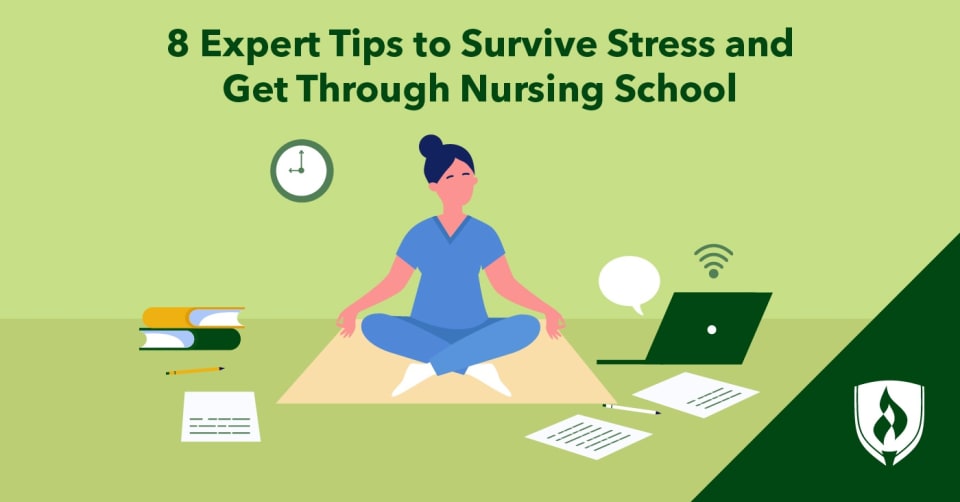
It doesn’t take much imagination to understand why nursing school can be stressful. Pressure to invest in a quality degree program, achieve high grades and pass critical licensure exams are only the beginning—then there’s the looming trepidation that comes with working everyday with patients.
Needless to say, there is a lot weighing on the mind of a typical nursing student. There is no way to completely eliminate nursing school stress from your life—in some cases, it could even spur you on to do your best! But there are ways to help alleviate some of the pressure.
Who better to learn from than those who have made it through? We gathered nursing school advice and stress management tips from experienced nurses who handled the experience in stride. Read on to learn more about what can make nursing school stressful—and what you can do to manage it.
Get Your Nursing School Questions Answered at a Nursing Information Session
What causes nursing school stress?
Nursing school has a reputation for being challenging. Most aspiring nurses don’t embark on their degree program assuming they’re going to skate by doing the bare minimum. The demanding workload is certainly part of the stress equation, but it’s not the only thing to consider.
Nursing school presents a mixture of complicated subject matter to learn, including memorizing unfamiliar medical vocabulary, performing hands-on clinical work, and demonstrating a high-level understanding of nursing ethics and patient care best practices—just to name a few. Traditional study tips can help, but the fact remains that nursing students have to master a wide array of topics.
On top of this, many nursing students dive so far into their studies, they feel as though they’re in a bubble. “Classes are intense, and workloads are heavy. This leaves very little time to socialize and have fun,” says Alaina Ross, registered nurse (RN) and expert contributor to Test Prep Insight. “This social isolation can compound any school-related stress you're feeling.”
8 Tips for surviving nursing school stress
You get the picture: Nursing school won’t always be a walk in the park. But that doesn’t mean you need to live with nursing school stress for the duration of your program! Use these “survival” tips from nurses to lighten the load of nursing school.
1. Develop a routine
Nursing school is a marathon, not a sprint. You’ll burn out quickly if you approach your studies without a plan.
“The most stressed-out nursing students I saw were the ones that tackled each day without a plan,” Ross says. “Having a set routine will help you stay focused and get through each day,” Ross says.
She recommends plotting out chunks of your day for different tasks, such as reviewing flashcards, completing homework or meeting with a study group. Don’t forget to include time for exercise, cooking a nourishing meal and relaxing!
2. Practice an after-class recap
Don’t wait until an exam is looming to start studying! Reviewing the most important material soon after your class is over can help you solidify what you’ve learned. This can help keep the list of things you need to extensively review and master much more manageable. Reviewing your notes shortly after a class is not only a great way to reinforce what you’ve just learned but also a way to identify gaps in your understanding so you can ask for clarification—without it being the night before a test.
3. Find a solid study group
Meeting with a study group offers a fresh way to review information beyond flipping through flashcards alone. A study group that meets weekly can compare notes, demonstrate skills and practice NCLEX-style questions that can be difficult to tackle on your own.
Having other students to lean on through nursing school is important for the social support as much as for actual studying! Dr. Jenna Liphart Rhoads, a nurse and educator at NurseTogether.com, shares that “making a friend in my nursing program who mirrored my outside life, study style and goals were the most helpful for getting through nursing school.”
A study group can solve two potentially stress-causing problems at once by providing both social and academic support. For nursing students who are short on time, that’s a win-win!
4. Mix exercise into your study sessions
When you feel your stress levels spiking, get moving! While exercise has long been a solid outlet to help relieve stress and anxiety, it can also boost your ability to retain the information you’re studying. Regular exercise can promote factors that promote mental acuity—like less stress-induced mental fog.1
In the right circumstances, you may even be able to reap the benefits of exercise while studying. A long brisk walk with nursing school classmates where you discuss course materials or quiz each other with flashcards can be an excellent way to accomplish both.
Then again, getting active can also just be a way to push everything else on your plate aside—and that’s OK! Exercise can also provide a valuable break from nonstop studying. “Exercise helped me process the emotional situations that are a part of nursing school, take a mental break from studying and learning and keep my body healthy, which helped my mental health,” Liphart Rhoads says.
5. Eat well and nourish your body
While your health and sanity might be able to endure a short period of exhaustion, caffeine and on-the-fly meals, your performance will plummet as the months add up. “Never forget the mind-body connection,” says Sarah Johnson, RN and health ambassador at Family Assets.
Eating well is a crucial part of reducing stress, such as whole grains like oatmeal or quinoa that can release calming chemicals in the brain.2 However, it can be particularly difficult to eat well during nursing school because high stress can cause people to overeat unhealthy comfort foods.3 Start by making simple swaps, like reaching for carrots and hummus instead of potato chips during a study session.
Think of eating well as an investment in your nursing career. It will help you bring your best game, sustainably, throughout nursing school and beyond. “Treat your body well, and you will be better equipped psychologically to deal with the stress,” Johnson says.
6. Rely on your support system
Don’t get so absorbed in nursing school that you forget to connect with those who want to cheer you on along the way. Make time for regular catch-up conversations, share your struggles and successes, and accept help if it’s offered, such as ready-made meals or quizzing you before a big test.
“Leverage your network of family and friends to keep you positive and upbeat,” Ross says. “Call your parents on your commute to and from school, and catch up with friends over texts at lunch. These quick talks will help you stay positive and put a smile on your face.”
7. Ask for help
No one said you have to do nursing school all on your own. In addition to social support from friends and family, academic help is available right in the midst of your nursing school experience. Do not hesitate to reach out and ask for help—remember, no one involved with your nursing education wants you to fail.
Talk to your professors via email or during office hours if there are concepts you need help understanding. Ask a librarian if you’re struggling to find the right resource or need help conducting research. Ask a classmate to compare notes if you’re struggling to recall what you meant when you jotted something down.
There’s no bonus to going through nursing school in isolation. Keep an eye out for opportunities to ask for help from others!
8. Seek out peer support
Family and friends aren’t the only ones who can support you through nursing school. Getting official academic support can be just as much of a boost! A good nursing program will offer plenty of options for academic help if you know where to look.
For example, you can seek out help through the peer tutoring and peer mentoring programs at Rasmussen University. These academic support programs can match you with a student tutor or mentor who has is qualified to help you improve your study habits and work through any academic areas you need assistance with.
You can get through nursing school
Whether you’re still considering a career in nursing or you’re already halfway through your degree program, follow these stress management tips to help keep nursing school stress at bay. Still looking for more resources? Find some more nursing student resources here.
Of course, navigating nursing school is only the tip of the iceberg when it comes to potentially stressful situations you’ll encounter on the way to becoming a nurse. Another factor that may be looming large? The NCLEX® licensure exam awaiting you after graduation. Fortunately, we’ve got you covered—our article “Nurses Share 13 NCLEX Exam Tips That Helped Them on Exam Day” can help you get prepared.
1“Healthbeat: Exercising Can Boost Your Memory and Thinking Skills” Harvard Health Publishing. February 15, 2021 [accessed May 2021] https://www.health.harvard.edu/mind-and-mood/exercise-can-boost-your-memory-and-thinking-skills
2Dr. Craig Sawchuk “Coping with Anxiety: Can Diet Make a Difference?” Mayo Clinic. May 24, 2017 [accessed May 2021] https://www.mayoclinic.org/diseases-conditions/generalized-anxiety-disorder/expert-answers/coping-with-anxiety/faq-20057987
3Harvard Health Publishing, “Harvard Mental Health Letter: Why Stress Causes People to Overeat” February 15, 2021 [accessed May 2021] https://www.health.harvard.edu/staying-healthy/why-stress-causes-people-to-overeat
NCLEX is a registered trademark of the National Council of State Boards of Nursing, Inc.
EDITOR’S NOTE: This article was originally published in January 2014. It has since been updated to reflect information relevant to 2021.




